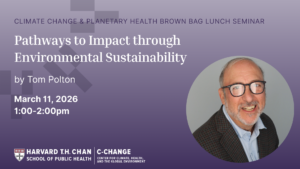Climate Change and Planetary Health
Introduction
Climate change, air pollution, and ecological degradation have had extreme impacts on the health of our planet. Our ability to urgently and ambitiously implement climate crisis solutions will define public health outcomes for generations to come.
The Climate Change and Planetary Health concentration, launched in fall of 2024, will help you understand the consequences of the current planetary health crisis, including the effects on food, water, air, extreme weather events, heat, migration, and political stability and their subsequent impacts on infectious diseases, non-communicable diseases, nutrition, and mental health.
Students in this concentration will also learn about the health inequity born out of environmental degradation. Structural racism and international economic policy have exacerbated the climate crisis, with communities of color, poor communities, and the Global South being disproportionately impacted. You will be equipped to use research, leadership, advocacy, and policy to implement solutions that better serve these populations.
The concentration is led by faculty co-directors Dr. Gaurab Basu, assistant professor and core faculty at Harvard Chan C-CHANGE, and Dr. Chris Golden, associate professor and director of the Program in Nutrition and Planetary Health.
If you have any questions about the concentration, please email gbasu@hsph.harvard.edu or golden@hsph.harvard.edu.
Curriculum
This is a ten-unit concentration for all degree programs at Harvard Chan School. Students in this concentration will be required to choose one of two tracks (research methodologies or research translation) and take 5 units of core curriculum courses, 2.5 units of track courses, and 2.5 units of elective courses at Harvard Chan School and across Harvard University. All courses must be taken for a letter grade to be counted towards this concentration.
Core
You must complete 5 credits from the courses below.
| Course | Course ID | Credits | Instructor | Term |
|---|---|---|---|---|
| Climate Change, Health, and Environmental Justice-Focusing on Policy and Solutions | EH 213 | 5 | Nadeau, Rice | Fall* |
| Human Health and Global Environmental Change | EH 278 | 2.5 | Dresser | Spring 2 |
| An Introduction to Planetary Health | ID 220 | 2.5 | Golden | Spring** |
| Climate Change and Global Health Equity | EH 207 / HMS GH722 | 2.5 | Basu, Marwah | Spring 2 |
| The Politics of Climate and Global Health | EH 209 | 5 | Kerry | Fall |
| Societal Response to Disasters | ID 205 | 2.5 | Balsari, Leaning | TBD |
Tracks
In addition to the Core courses, you must choose either the Methods or Translations track, and complete 2.5 credits from the respective course list.
| Methods | ||||
| Advanced Regression for Environmental Epidemiology | ID 271 | 2.5 | Zanobetti, Schwartz | Spring 1 |
| Introduction to Spatial Methods for Public Health | GHP 534 | 2.5 | Castro | Spring 2 |
| Applied Regression | BST 210 | 5 | Thaweethai | Spring |
| Applied Regression | BST 210 | 5 | Lake | Fall |
| Survey Research Methods in Community Health | BST 212 | 2.5 | Mangione | Spring |
| Intro to Quantitative Methods for Monitoring and Evaluation | BST 216 | 2.5 | Hedt-Gauthier | Spring 1 |
| Core Principles of Data Science | BST 219 | 5 | Mattie | Fall |
| Applied Longitudinal Analysis | BST 226 | 5 | Fizmaurice | Spring |
| Intro to Data Science | BST 260 | 5 | Irizarry | Fall |
| Data Science 2 | BST 261 | 2.5 | Romero- Brufau | Spring |
| Statistical Learning | BST 263 | 5 | Coull | Spring |
| Quantitative Methods in Health Research: Practice, Principles, and Critical Considerations | DRPH 200 | 2.5 | Aveling | Fall 1 |
| Applied Survey Research | HPM 285 | 2.5 | SteelFisher | Spring 2 |
| Qualitative Data Analysis for Public Health | SBS 521 | 2.5 | Ramanadhan | Fall 2 |
| Introduction to Dissemination and Implemention Science | SBS 210 | 2.5 | Ramanadhan | Spring 2 |
| Community-based Participatory Research: Principles, Processes and Practices | SBS 501 | 2.5 | Chu, Nalls | Spring 1 |
| Community-based Participatory Research: Field Engagement and Practice | SBS 551 | 2.5 | Chu, Nalls | Spring 2 |
| Translation | ||||
| Narrative Leadership | HPM 562 | 2.5 | Stojicic | Fall 2 |
| Practical Communication Strategies and Tactics for Influencing a Healthier World | SBS 285 | 2.5 | Burness | Fall 1 |
| Engaging with the press: A practical look at health communication | SBS 225 | 2.5 | Toffel | Fall 2 |
| Environmental Health Literacy and Science Communication | EH 286 | 2.5 | Tomsho, James-Todd | Fall 1 |
| Community Practice in Environmental Health | EH 291 | 5 | Adamkiewicz, Backus | Spring |
| Health Communication in the 21st Century | SBS 509 | 2.5 | Viswanath | Spring 1 |
| Advocacy and Organizing for Health Policy | HPM 566 | 1.25 | Rosenthanl, Sheff | Spring 1 |
| Writing Persuasively about Public Health | HPM 513 | 2.5 | Harris | Spring 1 |
| Public Health in Action: Strategies for Policy, Advocacy, and Communication | SBS 211 | 2.5 | Brown | Spring 2 |
| Understanding Public Health Leadership: From Frameworks to Practice | HPM 503 | 2.5 | Koh | Winter |
(You must complete 2.5 credits from the courses below.*)
| Course | Course ID | Credits | Instructor | Term |
|---|---|---|---|---|
| Built Environment, Nature, and Health | EH 249 | 2.5 | James | Fall 2 |
| Confronting Climate Change: A Foundation in Science, Technology and Policy | GENED 1094 | 4 | Schrag | Fall |
| Atmospheric Environment | EH 297 | 5 | Koutrakis, Hanna | Spring |
| Understanding Public Health Leadership: From Frameworks to Practice | HPM 503 | 1.25 | Koh | January |
| Reweaving Ourselves and The World : New Perspectives on Climate Change | IGA 453 | 4 | Henderson | Spring |
| High Performance Buildings for Health, Comfort and Sustainability | EH 252 | 5 | Allen | Spring |
| Food and Global environment | EH 212 | 2.5 | Adamkiewicz | Spring |
| Water pollution | EH 257 | 5 | Levin | Spring |
| Environmental Justice: Concepts and Practice | EH 525 | 2.5 | Adamkiewicz, James-Todd | Spring 1 |
| Teaching Climate Change | T801 | Grotzer | January | |
| Health and Climate Crises: A History | HISTSCI 1410 | 4 | Jones | Fall |
*Students are encouraged to take electives from across Harvard University. Please see the Harvard University Salata Institute’s listing for university-wide courses here. Students should email concentration leadership for approval of elective courses.
- Gary Adamkiewicz, Associate Professor of Environmental Health and Exposure Disparities, Department of Environmental Health
- Barrak Alahmad, Research Fellow, Department of Environmental Health
- Satchit Balsari, Associate Professor in Emergency Medicine,Harvard Medical School
- Gaurab Basu, Assistant Professor of Medicine and Global Health & Social Medicine, Harvard Medical School; Assistant Professor of Environmental Health at Harvard T.H. Chan School of Public Health; and Director of Education and Policy at the Center for Climate, Health, and the Global Environment at Harvard Chan School.
- Lindsey Burghardt, Chief Science Officer, the Center on the Developing Child
- Marcia Castro, Andelot Professor of Demography, Department of Global Health and Population
- Brent Coull, Professor of Biostatistics, Department of Biostatistics
- Antea DeMarsilis, Instructor in Medicine, Harvard Medical School and Beth Israel Deaconess Medical Center
- Francesca Dominici, Clarence James Gamble Professor of Biostatistics, Population, and Data Science, Department of Biostatistics
- Caleb Dresser, Assistant Professor of Emergency Medicine, Harvard Medical School
- Ann-Christine Duhaime, Nicholas T. Zervas Distinguished Professor of Neurosurgery,
Harvard Medical School - Erin Driver Lynn, Dean for Education, Office of Education
- John S. Evans, Adjunct Professor, Department of Environmental Health
- Sarah Fortune, John LaPorte Given Professor of Immunology and Infectious Diseases, Department of Immunology and Infectious Diseases
- Chris Golden, Associate Professor of Nutrition and Planetary Health, Department of Nutrition
- Rose Goldman, Associate Professor in the Department of Environmental Health, Department of Environmental Health
- Jaime Hart, Associate Professor in the Department of Environmental Health, Department of Environmental Health
- Nima Hejazi, Assistant Professor of Biostatistics, Department of Biostatistics
- Peter James, Adjunct Associate Professor of Environmental Health, Department of Environmental Health
- Tamarra James Todd, Mark and Catherine Winkler Associate Professor of Environmental Reproductive Epidemiology, Department of Environmental Health
- Vanessa Kerry, Professor of Practice, Department of Environmental Health
- Shadi Kouroch, Associate Professor of Dermatology, Harvard Medical School
- Francine Laden, Professor of Environmental Epidemiology, Department of Environmental Health
- Kimberlyn Leary, Associate Professor, Department of Health Policy and Management
- Josiemer Mattei, Donald and Sue Pritzker Associate Professor of Nutrition, Department of Nutrition
- Murray Mittleman, Professor of Epidemiology, Department of Epidemiology
- Aviva Musicus, Adjunct Assistant Professor of Nutrition, Department of Nutrition
- Kari Nadeau, John Rock Professor of Climate and Population Studies, Department of Environmental Health
- Dan Neafsey, Associate Professor of Immunology and Infectious Diseases, Department of Immunology and Infectious Diseases
- Rachel Nethery, Assistant Professor of Biostatistics, Department of Biostatistics
- Amruta Nori-Sarma, Assistant Professor of Environmental Health and Population Science, Department of Environmental Health
- John Quackenbush, Henry Pickering Walcott Professor of Computational Biology and Bioinformatics, Department of Biostatistics
- Shoba Ramanadhan, Associate Professor of Social and Behavioral Sciences, Department of Social and Behavioral Sciences
- Mary Rice, Director, Center for Climate, Health, and the Global Environment at Harvard Chan School
- Joel Schwartz, Professor of Environmental Epidemiology, Department of Environmental Health
- Iris Shai, Adjunct Professor of Nutrition, Department of Nutrition
- Caren Solomon, Associate Professor of Medicine, Harvard Medical School
- Nancy Turnbull, Senior Associate Dean for Educational Programs
- Paul Venton, Instructor, Office of Education
- Vish Viswanath, Lee Kum Kee Professor of Health Communication, Department of Social and Behavioral Sciences
- Katherine von Stackelberg, Senior Research Scientist, Department of Environmental Health
- Walter Willett, Professor of Epidemiology and Nutrition, Department of Nutrition
- Amanda Yarnell, Lecturer on Social and Behavioral Sciences, Department of Social and Behavioral Sciences
Learning Objectives
Interpret foundational science related to climate and environmental change.
- Explain the impact of anthropogenic greenhouse gas emissions on global climate (greenhouse effect).
- Describe historical trends and current sources of anthropogenic greenhouse gas emissions and air pollution.
- Understand how human activities impact ecological stability, land use changes, biodiversity, water pollution, deforestation and food systems.
Define the mechanisms by which climate change and ecological degradation influence public health.
- Identify public health findings in major reports such as the U.N. Intergovernmental Panel on Climate Change report, U.N. Intergovernmental Science-Policy Platform on Biodiversity and Ecosystem Services, and National Climate Assessment.
- Explain the ways by which climate change and ecological degradation influence public health through environmental exposure pathways including natural disasters/extreme weather events, changes in water quantity and quality, food insecurity, heat stress, air pollution, and vector borne infections.
- Identify risks for disease emergence arising from ecological degradation in the form of deforestation, land use changes, agricultural practices, habitat encroachment, pollution, and biodiversity loss.
- Describe how the acute and chronic impacts of climate change and ecological degradation affect mental health.
- List ways in which the delivery of health care creates greenhouse gas emissions, pollution, environmental toxicants and waste.
- Explain how climate change can interfere with the delivery of health care through effects on access to care and impacts on health care facilities and supply chains.
Analyze the historical and structural causes of climate change and ecological degradation and describe the ways in which it creates/exacerbates health inequity.
- Identify the ways in which Black and Indigenous people, and people from the Global South contribute to climate and planetary solutions.
- Explain how climate change and ecological degradation intersects with structural racism and health equity in the U.S. (e.g. redlining, heat islands, the disproportionate impact on certain populations, intersecting health challenges, access to adaptive and protective measures).
- Define environmental justice and recognize its importance to climate and planetary health solutions.
- Describe impacts of climate change and planetary health on global health inequities (e.g. natural disasters/extreme weather events, forced migration, social instability, political conflict, food security, water scarcity, and sea level rise), including inequitable resource allocation for adaptive responses.
Develop public health skill sets to contribute to climate and planetary solutions.
Research Methodologies track
- Use foundational biostatistical and epidemiological methodology to contribute to scientific discovery at the intersection of public health, climate change and planetary health.
- Translate scientific findings to the public forum.
Research Translation track
- Execute policy and advocacy strategies that promote a healthy planet.
- Communicate the health and health equity benefits of climate and planetary solutions to the general public, policy makers, and patients, and address climate science misinformation.
- Examine the role research, health systems, education, communication, community partnership, and advocacy play in the development of climate and planetary solutions.
Enrollment
All MPH, MS, DrPh, and PhD students are eligible to participate in the concentration.
Concentration students are encouraged to attend monthly community learning lunch sessions with faculty and guest speakers on relevant topics and participate in field trips, practicum work, and other special programming.
Once you are accepted to Harvard Chan School, please complete this form to express interest in this concentration. You will receive instructions and further details from Skye Flanigan (Flanigan@hsph.harvard.edu) after you complete the form.
Concentration News & Events
-
Pathways to Impact through Environmental Sustainability
The Climate Change & Planetary Health Concentration invites you to their next Brown Bag Lunch Seminar: Title: Pathways to Impact through Environmental Sustainability Speaker: Tom Polton Location: FXB G-12 Everyone is welcome, whether or not…


